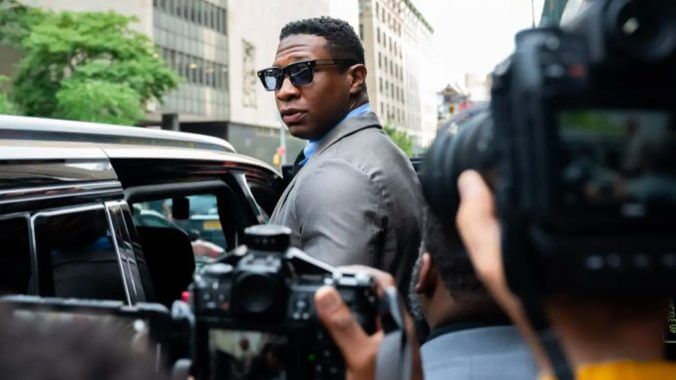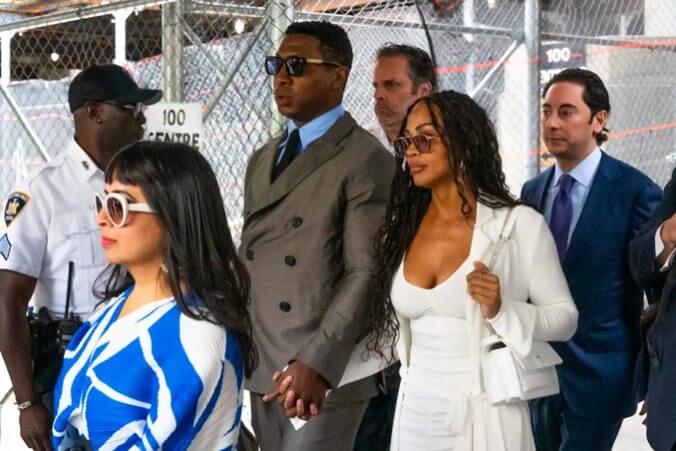Jonathan Majors’ Trial Has Been Jarring. Domestic Violence Experts Have Seen It All Before.
“Sometimes [accused men] deny the abuse happened, and sometimes they just deny that it was wrong," sexual violence researcher Dr. Nicole Bedera told Jezebel.
Photo: Getty Images In Depth Jonathan Majors
Over the last two weeks, Jonathan Majors’ ongoing domestic violence trial has unearthed a series of gutting revelations about his former relationship with Grace Jabbari, whom Majors is charged with assaulting one evening in March. After closing statements were made on Thursday, the jury began deliberating and returned Friday afternoon to ask the judge to explain each of the four different assault charges against Majors, Courthouse News reported. Jurors also asked for access to specific pieces of evidence, including Majors’ 911 call the morning after the alleged assault, and footage of him and Jabbari the evening of the alleged assault. The court adjourned for the day before the jury returned with a verdict and will resume deliberating next week.
“Jonathan Majors is innocent and Grace is a liar,” Priya Chaudhry, Majors’ lead attorney, said point-blank during closing arguments, following hours of tense back-and-forth. Majors’ attorneys leaned hard into the narrative that Jabbari is accusing Majors of abuse solely to punish him for ending the relationship after the alleged assault. Majors’ camp also doubled down on their claim that she was the aggressor against him. By contrast, prosecutors said their case could be summarized with four words: “Control, domination, manipulation, and abuse.” Prosecutors further emphasized that Jabbari leads a highly private life, and didn’t have anything to gain—and far more to lose—from accusing Majors.
In all, Majors’ trial has been almost unbearable to watch—at one point last week, Majors’ attorney asked Jabbari about her high school ex-boyfriend’s alleged suicide, prompting Jabbari to cry and briefly leave the room. The emotions, allegations, and personal attacks have been gut-wrenching—and, to domestic violence experts like Dr. Nicole Bedera, the trial follows the cadence of legal disputes involving intimate partner abuse that she “sees all the time.” The approach of Majors’ legal team—to question Jabbari’s credibility and frame Majors as her victim—has been particularly familiar.
This week, Majors’ legal team called his driver as a witness, and the driver claimed Jabbari had been the aggressor toward Majors on the evening of the alleged assault. (Prosecutors responded by arguing Majors’ driver “reveals [himself] to be a biased witness to the man who paid him.”) This testimony came after, earlier in the trial, the judge referenced Majors’ counter-claim that Jabbari had assaulted him, resulting in her October arrest. The judge called this sequence of events “very unusual” because New Yorkers aren’t typically able to press charges months later, as Majors did. The Manhattan District Attorney’s office in October declined to prosecute Jabbari, determining there was “no prosecutorial merit” to Majors’s allegations. As this was read aloud in court Meagan Good, Majors’ current girlfriend who attended the entirety of the trial, visibly shook her head.
Here is the voice recording where Majors chastises his ex-girlfriend, saying he's a "great man" and needs a "great woman" like Michelle Obama or Coretta Scott King. Majors was upset she went to the pub with a friend pic.twitter.com/DQWO7sCBzQ
— Cheyenne Roundtree (@cheyenneisround) December 13, 2023
To Bedera, this—characterizing Jabbari as the one who’s dangerous to Majors—is “how DARVO [deny, attack, reverse victim and offender] works.” She explained, “It’s about bringing up things the victim has done to suggest the victim is not a perfect victim, they’re not a deserving victim, they’re not a good victim.” For example, Bedera points to the suggestion from Majors’ camp that Jabbari is mentally unstable, or can’t be a victim because victims don’t go to parties, or that she’s the one who poses a threat to Majors. “Sometimes they deny the abuse happened, and sometimes they just deny that it was wrong, because it was actually ‘self-defense.’”
-

-

-

-

-

-

-

-

-

-

-

-

-

-

-

-

-

-

-

-

-

-

-

-

-

-

-

-

-

-

-

-

-

-

-

-

-

-

-

-









































